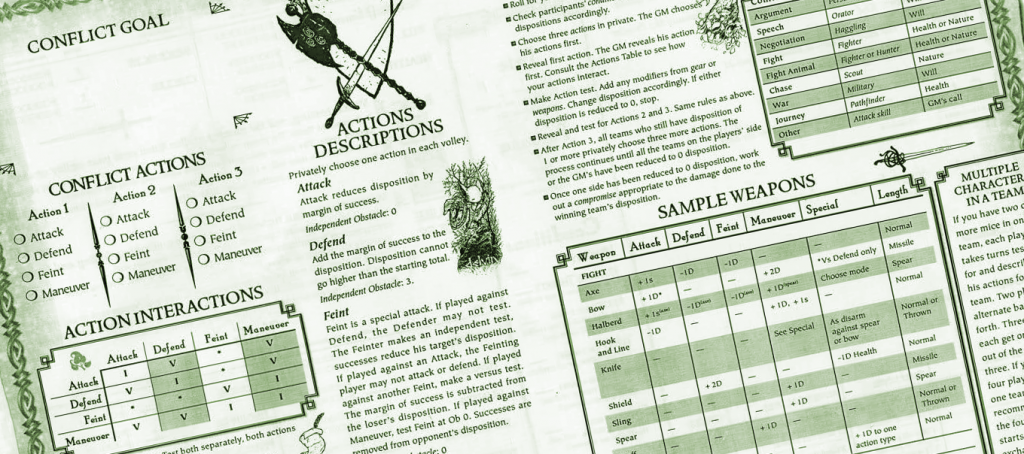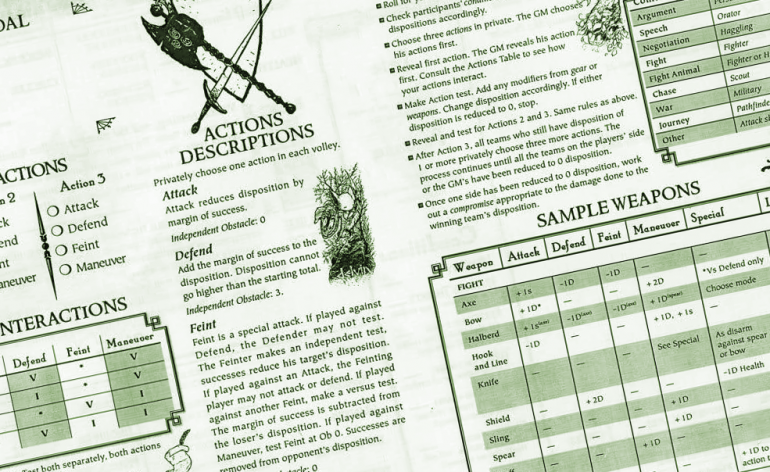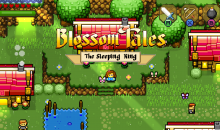Tenderpaw: GM Lessons from the Guard

As I had written, I started running the Mouse Guard Roleplaying Game for my group three weeks ago. The first few sessions were bumpy. Quite bumpy. Bumpy enough that I started our third session not knowing if there would be a fourth.
I’ll cut to the chase: the third session was fucking awesome. Luke Crane’s games are known for their required system mastery, and we are successfully climbing the learning curve as a group. I’m going to wait until we conclude our current story before writing a review of Mouse Guard itself, but I have learned a few profound GMing lessons from my time in the Territories that are applicable across all table-top gaming.
Lesson One: Have Faith in the Game
Mouse Guard is a well designed and intricate contraption, and it can cause frustration for the uninitiated. Despite the fact that no single element of the game takes more than a few sentences to explain, all of the elements interact with each other. All of them. When the Mouse Guard wheel is turning all of the elements work in unison to create a feedback loop that incentivises and rewards a particular play style. However, this feedback loop is emergent: you have to discover it through play. If I hadn’t kept true to the system through my frustration to learn it and see it through, I would never have found this reward system.
My example: The PCs gained the Sick condition after being stuck in a sleet storm during the GM’s Turn. One of my players wanted to immediately make a Survival test to make a fire, hopefully alleviating the condition. Flipping through the rule book, I came back with an answer I don’t give players very often: “No.”
Why not? It’s not the time for recovery tests. Save it for the Player’s Turn.
I can’t do it during the GM’s Turn? You have to spend two checks to attempt to recover during the GM’s Turn. (Checks gained by using your Traits against you when you roll dice.)
I haven’t rolled the dice yet this session, how can I have two checks? You can’t.
At the time it seemed senselessly arbitrary and unyielding. I eventually learned that the economy of those player earned checks is crucial: allowing free mid-GM-Turn recovery would lessen the value of the checks. That would make them less desirable for the player to gain, so they wouldn’t use their Traits against themselves. That would make for less epic stories and, in turn, less epic guardmice. The feedback loop hinges on that “no” answer, I just lacked the perspective to see it at the time. If I would have lost faith and drifted the rules, we would never have seen the full arc of the reward system.
Lesson Two: Keep Up the Momentum
In Mouse Guard, the narrative is shaped by the dice no matter how they fall. Every test that ends in a failure is an opportunity for the GM to introduce a twist in the plot or allow the players to succeed in exchange for the PC getting hit with a negative condition. At first I just thought that this was just a codified way to make sure that the players are challenged fairly. I missed the real reason behind this design: it is impossible for a game of Mouse Guard to lose momentum. This allows success to be success: you are awesome and you get what you want. But it also allows failure to be interesting: the game may move in a new challenging way, but the story keeps moving.
It is a valid choice to fail. Think about that. I’m not sure how I’m going to implement it in other games traditional games that treat failure like a dead end, but Mouse Guard has set the bar for momentum and I’m not sure I can go back.
Lesson Three: Prep Only What You Need
I am a worry-wart GM that gets lost in the details. I have wasted countless hours fretting over little things that would never come into play when I was running D&D. If I would have planned out only the important stuff, trusted myself to improv the rest, and run with what the players gave me, I would have had the same fun with a third of the stress. Mouse Guard enforces this play style through the system.
The third session, the “good” session, took me about 30 minutes to prep and the notes fit on a page. The fact that Mouse Guard is fueled by the dice, the system itself stops me from spending any more time preparing. You can (and should) have a head full of fun ideas for your players, but you shouldn’t feel compelling to dwell on them. Wait for your opportunity to strike and deploy your fun ideas when you can. This is Mouse Guard’s default mode and I can see that it is quickly becoming my default mode for running any game.
Advancing to Game-Wise 3
I’m only three sessions into Mouse Guard and I’m already soaking in lessons that are fundamentally changing how I approach running a game. As I mentioned, I’m planning on writing up a full review of the Mouse Guard Roleplaying Game after this arc wraps up. After this last kickass session, I can’t wait to see how it plays out!







Pingback: Stuff #1 « Covil do Delibriand
Pingback: ‘Mouse Guard RPG’: Lessons from a GM | Archaia Entertainment
Pingback: Stuff #1 | Forja RPG
Great post. Mouse Guard is one of my favorites and is definitely one of those games that I feel like I understand and appreciate more the more I play it. Despite being a much lighter version of the Burning Wheel rules, there’s still so much depth and potential there.